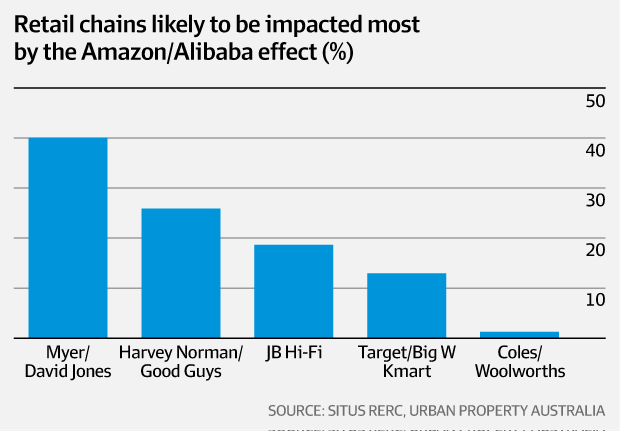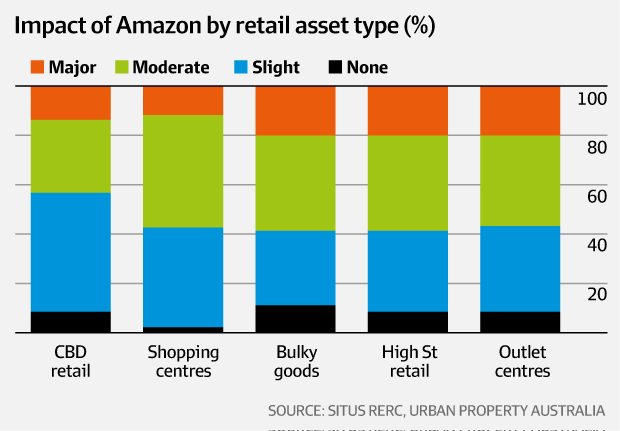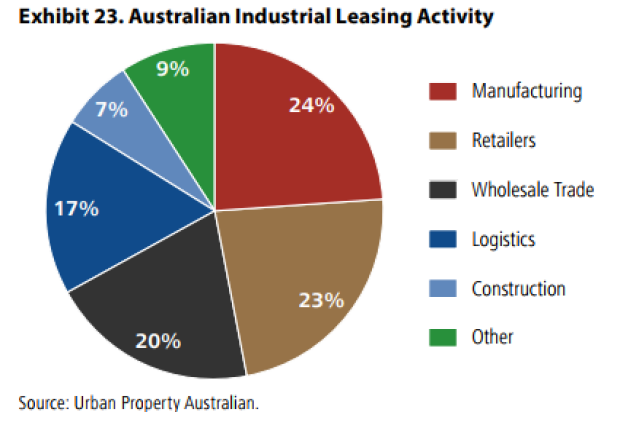Two out of five investors surveyed by UPA/Situs said struggling department store operator Myer and its rival, David Jones, would be the most impacted by Amazon, ahead of traditional bulky goods retailers Harvey Norman and The Good Guys (25 per cent) and electronics and white goods retailer JB Hi-Fi.
press-media
Myer, David Jones to feel Amazon sting the most
March 12th 2018 | , Australian Financial Review
Department store groups Myer and David Jones, large-format retail centres and high street shopping strips will be the most heavily hit by the arrival of online giant Amazon, a survey of nearly 300 commercial real estate investors has found.
Least impacted will be city retail landlords and major shopping centre owners, according to the Australian Market Expectations Survey carried out by consultants Urban Property Australia and US-based valuation firm Situs RERC.
UPA managing director Sam Tamblyn said investors were more bearish on large-format retail and retail strips because of their inability to offer an “experience” to shoppers compared with major city centres and mega malls like Chadstone.
“The way Amazon is set up, they go after segments where consumers do not require an experience. If you’re buying an iPad you’re going to buy it online,” he told The Australian Financial Review.

Supermarket giants Coles and Woolworths are not expected to feel the Amazon effect, despite the potential for it to bring its grocery delivery service to Australia.
Serious threat
As Amazon gears up to offer its products and retail services in Australia, perhaps as early as Christmas, nearly all of the 276 landlords, fund managers, investment bankers, REIT analysts, superannuation fund managers, valuers, financiers, private investors and real estate agents surveyed said Amazon will be a success here.
“Investors face a very real and serious threat with the expected arrival of Amazon. Just as in other parts of the world, Amazon is expected to have a major influence and direct impact on Australia,” said Mr Tamblyn.

“Amazon should be a boon to the Australian economy and industrial real estate, but the retail sector will likely experience a major shake-up.”
Mr Tamblyn said retailers most exposed included JB Hi-Fi, Harvey Norman, Dymocks, BIG W, Kmart and Target given Amazon’s strengths in books, consumer electronics, clothing and sporting goods.
Speaking as part of a strategy update on Wednesday, Myer boss Richard Umbers highlighted the challenges facing traditional bricks-and-mortar retailers and the steps Myer is taking to compete with plans for an online marketplace dubbed Myer Market.
“The market is changing rapidly and we must embrace rather than resist these realities,” Mr Umbers said.

At the start of October, Amazon said more than 500 Australian businesses had registered to sell their products on Amazon Marketplace.
Amazon has also leased a big distribution centre in Melbourne, another is on the cards in Sydney and it is negotiating an express delivery service with Australia Post.
The UPA/Situs report expects Amazon’s logistics network will include one fulfilment centre in Brisbane, Sydney and Melbourne, with hundreds of 250-500-square-metre metropolitan delivery centres to service customers.
Low population density
“While Amazon has faced competitive hurdles in many of its other markets, its biggest challenge in Australia will be one of logistics. Australia is the sixth largest country in the world by area and given its low population density and the cost of shipping is likely to challenge Amazon’s delivery model,” Mr Tamblyn said.
Situs RERC president Ken Riggs said based on global trends witnessed in Amazon’s previous launches, it was reasonable to assume that Australia’s experience with the arrival of Amazon will be similar to what happened with Canada.
“As with Canada … Australia’s brick-and-mortar retailers can expect increased pressure to compete and will be forced into making their businesses an experience rather just a place to shop.
“Industrial and logistics centres, on the other hand, if properly located, will become more attractive as e-commerce increases the need for warehouse space,” Mr Riggs said.
Citigroup estimates that Amazon’s Australian sales could reach $4 billion within five years, representing about 14 per cent of all online sales and 1.1 percent of total retail sales in Australia.



